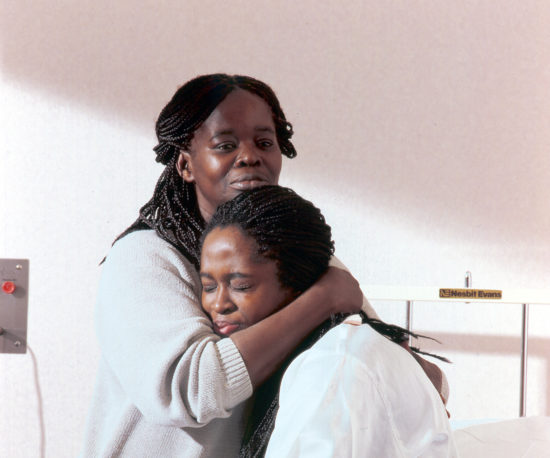Every woman should have access to a birth companion of choice throughout labour, birth and immediately after their baby is born. Read our ideas to help birth partners get prepared.
Birthing partners play a key role, however your baby is born. Having someone present who can care for and support a woman can lead to a better birth experience.
If you’re a birth partner and planning a vaginal birth, find out how you can get organised beforehand and help support your partner from the moment labour starts.
1. Talk through your role and how your partner wants you to help when they’re in labour.
2. Ask your partner if they’d like you to come along to antenatal classes and/or midwife appointments with them.

3. If you have one, talk through the birth plan with your partner so you know what they want. That way you can encourage them to keep mobile, change position, get into the water (if they are planning on using a birthing pool) or whatever’s key yet easy to forget in the moment.
4. You could do a bit of light reading – important things to find out about include the stages of labour, pain relief and relaxation techniques.
5. …Speaking of which, you could pick up massage oil to give your partner a relaxing rub in the early stages of labour (if she feels like one).
6. If possible, go on a tour of the hospital or unit so that you can both get familiar with it. Use the NHS maternity unit search for contact details and how to book a tour if they offer them. Many places now offer virtual tours, which is even easier.
7. Find out what’s available for you at the birth centre or hospital. You could see what facilities there are to stay over, for example.
Make a plan for travelling to the unit, especially if strike action is due to be happening.
8. Make a plan for travelling there, especially if ambulance strike action is due to be happening. If you’re driving, talk about routes. If you are going in a taxi, make sure you have the company’s number in your phone. Find out about parking too, to see if you’ll need to keep some change ready or download an app in advance.
9. Run through your partner’s hospital bag with them – and it’s a good idea to pack your own too. Some drinks, snacks, cash and a change of clothes will come in handy.
10. Be an advocate for your partner and support them during labour – this is especially important as they may be unable to communicate well as they’d like to at points.
1. Remember that support can include emotional support, for example your continued presence, reassurance and praise.
2. Help your partner use coping mechanisms and provide comfort measures such as touch, massage, warm baths or showers.
3. Encourage them to move around and make sure they’re drinking enough fluids.
4. Tell the midwives about your partner’s labour progress. You may also need to speak up for them, on their behalf if needed. They won’t want to process complex information, so communication should be clear and simple. As much as possible, ask them questions which just need ‘yes’ or ‘no’ answers.
1. How do you make contact with the hospital or birth centre when labour starts? (Make sure you both have the contact details in your mobile.)
2. Can you stay with your partner all the time or might you be asked to leave the room?
What happens and where do you need to go if the unit is temporarily closed because of staff shortages?
3. Can you stay overnight with them?
4. What will happen if they need to be transferred to hospital? (if you’re planning a birth at a birth centre)
5. Can you stay with your baby and partner after the birth?
6. Are there any facilities for birth partners, eg somewhere to wash and change?
7. What happens and where do you need to go if the unit or centre is temporarily closed because of staff shortages?
Some birthing mothers choose to hire a professional birth partner called a doula, or an independent midwife, to support them in a birth centre. This may be someone whom the woman has met previously in preparation for the birth, for example during antenatal education. Research shows that women who hire doulas are much less likely to have a low birth weight baby or experience a birth complication and are significantly more likely to initiate breastfeeding.
In a study, women and their partners both rated the experience of labour with the support of a doula as a positive experience.
Bear in mind that plans might change on the day, and your partner may need an unplanned caesarean. Your support as a birth partner will still be key.
Our support line offers practical and emotional support in many areas of pregnancy, birth and early parenthood: 0300 330 0700.
We offer antenatal courses which are a great way to find out more about birth, labour and life with a new baby.
Make friends with other parents-to-be and new parents in your local area for support and friendship by seeing what NCT activities are happening nearby.
NHS Maternity unit search helps you to find services, contact details and information.